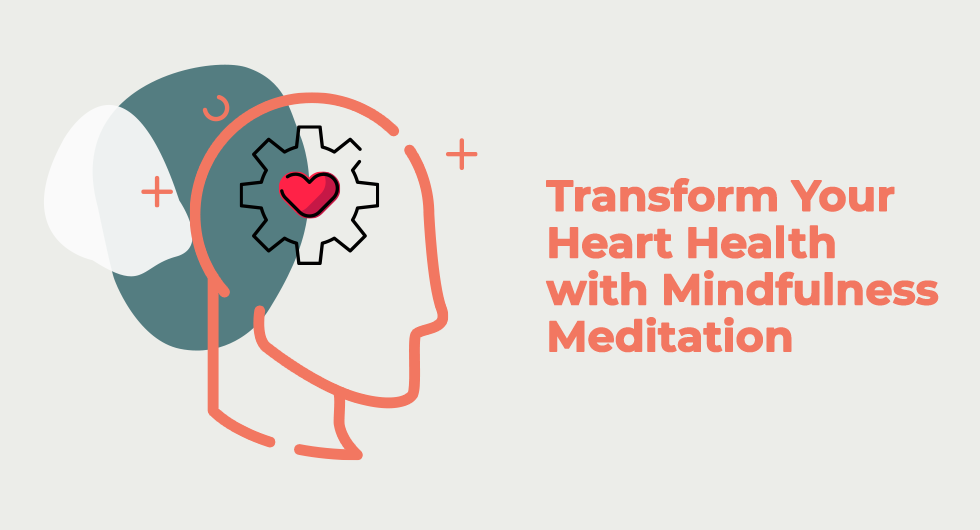Meditation, a practice that dates back thousands of years, involves techniques that promote relaxation, focus, heightened awareness and mindfulness. It’s a cornerstone of many spiritual traditions and has gained immense popularity in the modern world for its wide-ranging benefits.
Meditation can benefit an individual’s health in the long run. Studies have demonstrated its impact on the whole body from head to toe, general well-being and health. Improving heart health is among its most noticeable direct impacts.
In this article, let’s understand “What is mindfulness meditation”, and how Mindfulness Meditation can improve heart health to live longer and some benefits of meditation.
First, What is Mindfulness Meditation?

Before knowing the benefits of meditation, let’s first understand in detail “What is mindfulness meditation?”.
Mindfulness meditation is a practice that trains your mind to be more aware of the present moment. It combines two things:
- Mindfulness: This is the ability to focus your attention on what’s happening right now without judgment. You’re aware of your thoughts and feelings, but you don’t get caught up in them.
- Meditation is the practice of training your mind to focus and stay present. It involves techniques like focusing on your breath, bodily sensations, or the sounds around you.
Imagine your mind as a busy marketplace. Thoughts, worries, and plans flit around like vendors vying for your attention.
Mindfulness meditation helps you understand this marketplace without getting pulled into every stall. You learn to observe your thoughts and feelings without judgment and gently guide your attention to the present moment, like returning to a central anchor in the marketplace.
The Connection Between Stress and Heart Health
Stress is a significant contributor to heart health issues. Chronic stress triggers a cascade of physiological responses, including elevated blood pressure, increased heart rate, and heightened levels of stress hormones like cortisol.
Over time, these responses can lead to the development of hypertension, atherosclerosis, and other cardiovascular problems. Studies have shown that individuals with high-stress levels are more prone to heart attacks and strokes, highlighting the critical link between stress management and heart health.
Recognising the impact of stress on heart health underscores the importance of effective stress management techniques, such as mindfulness meditation, to promote cardiovascular well-being.
Incorporating Mindfulness into Daily Life
Mindfulness can extend beyond formal meditation sessions and seamlessly integrate into your daily routine to get the benefits of meditation.
Practise mindful eating by savouring each bite and paying attention to the flavours and textures of your food.
Engage in mindful walking, focusing on the sensation of your feet touching the ground and the rhythm of your steps.
Even routine tasks like washing dishes or drinking a cup of tea can become opportunities for mindfulness.
By incorporating mindfulness into everyday activities, you can cultivate a more present and peaceful state of mind, which will benefit your heart and overall well-being.
Integrating mindfulness into daily life not only enhances present moment awareness but also contributes significantly to sustained heart health and general wellness.
What are Some Benefits of Meditation?
Let’s know some benefits of meditation in this section.
Meditation is a practice that trains your mind and body to achieve a state of calmness and heightened awareness. There are many different forms of meditation, but they all share some common benefits of meditation:
- Reduce stress and anxiety: This is perhaps the most well-known benefit of meditation. Focusing your attention and quieting your mind can help you relax and let go of your worries.
- Improve focus and concentration: Meditation trains your mind to become less scattered and more present in the moment. This can lead to better focus on tasks and reduced distractibility.
- Increase self-awareness: Through meditation, you become more aware of your thoughts, feelings, and bodily sensations. This self-awareness can be valuable in managing emotions and making better choices.
- Enhance emotional regulation: Meditation helps you observe your emotions without judgment. This allows you to respond to them more controlled rather than being ruled by them.
- Improve sleep: Meditation can help you relax and quiet your mind before bed, leading to better sleep quality.
- Boost pain tolerance: Studies suggest meditation may help manage chronic pain by increasing your tolerance and reducing the emotional response to pain.
These benefits highlight the transformative potential of meditation, not just for mental clarity but also for fostering a healthier heart.
Does Meditation Lower Heart Rate?

Yes, meditation has been shown to lower heart rate. This is because meditation activates the body’s “rest-and-digest” functions, which counteracts our “fight-or-flight” responses.
Meditation has been extensively studied for its calming effects on the mind and body. One key physiological benefit is its ability to lower heart rate. A lower heart rate indicates a relaxed state associated with reduced stress and improved cardiovascular health.
Chronic stress can lead to an increase in heart rate and blood pressure, which can put a strain on the heart and increase the risk of heart disease. Meditation can reduce stress and lower heart rate, which may help to improve heart health.
Meditation activates the parasympathetic nervous system, which promotes relaxation and slows the heart rate. Techniques such as deep breathing, visualisation, and progressive muscle relaxation used in meditation can help achieve this effect.
Understanding how meditation lowers heart rate reinforces its role as a valuable tool for maintaining cardiovascular health.
Understanding Heart Meditation
Heart meditation is a practice that focuses on cultivating positive emotions and connecting with your inner self. It can involve different techniques but generally aims to bring about feelings of love, compassion, and peace.
Here are some things to know about heart meditation:
- Heart-rhythm meditation (HRM) synchronises your breath with your heartbeat. By focusing on your heart and consciously controlling your breathing, you aim to influence your mental, emotional, and physical state. This practice is claimed to have the therapeutic benefits of meditation.
- Opening the Heart Chakra approach uses meditation to connect with the heart centre, considered an energy centre in the body in some traditions. The goal is to cultivate feelings of love, compassion, and forgiveness. Techniques may involve visualisation or affirmations.
By focusing on the heart, these meditation practices foster emotional well-being and reinforce the connection between mind and body, essential for holistic heart health. Incorporating the Evolv28 device into your mindfulness meditation routine can elevate the practice, making it more effective and accessible for achieving a state of inner peace and heart health. Let’s know how it helps in mindfulness meditation.
How Does the Evolv28 Device Help in Mindfulness Meditation?
Evolv28 is a state-of-the-art wearable device designed specifically to enhance mental wellness by reducing anxiety. Through its advanced Variable Complex Magnetic Fields (VCMF) technology. With its feather-light, low-frequency magnetic pulses, Evolv28 safely and effectively recalibrates your brain’s natural waves, restoring harmony and balance.
Here are some features that make Evolv28 stand out from others:
- Ultra-Low Magnetic Fields: The device emits magnetic fields below 10 milligauss, which are very gentle and align with the Earth’s natural magnetic rhythms. This low level of exposure is safe and helps reduce anxiety and stress naturally, creating an ideal mental state for mindfulness.
- Innovative Use of Zinc and Magnesium: The device incorporates zinc and magnesium in its ferromagnetic media, which enhances brain function and synchronisation. These elements are known to support neurological health, promoting better brain wave activity that aligns with the goals of mindfulness meditation, such as improved focus, relaxation, and mental clarity.
- Science-Backed and Clinically Proven: Clinical trials have shown that Evolv28 significantly improves stress, anxiety, and sleep quality. These are critical areas for mindfulness meditation, as reducing stress and anxiety allows for a more focused and serene mind. At the same time, better sleep supports overall mental health and readiness for meditation.
- Regulatory Approved: The device meets international safety standards, including CE, FCC, ISED, SAR, and WPC certifications. These approvals ensure that the device is safe to use, giving users peace of mind about its impact on their health, which is crucial for a stress-free meditation experience.
What’s more Evolv28 offers for mindfulness meditation?
- Convenient and Portable: Evolv28 is designed for ease of use and portability. It can be worn while performing daily tasks, meaning users do not need to set aside specific time slots for meditation. This convenience helps integrate mindfulness into daily routines, making it more accessible and less burdensome.
- Quiet Operation: The device operates silently, which is essential for meditation, as noise can be distracting. The quiet function helps create a peaceful environment, allowing users to focus on breathing and meditation practices without interruption.
- Enhances Emotional Balance: The magnetic waves emitted by Evolv28 help restore peace and balance by harmonising brain activity. This effect supports emotional stability, an essential aspect of mindfulness meditation, as a balanced mind is more capable of maintaining focus and achieving a state of calm.
- Non-Invasive Technology: The Evolv28 uses Variable Complex Magnetic Fields (VCMF) technology, which is non-invasive. This means it influences brain activity without penetrating the body or using surgical procedures. Non-invasive methods are preferable for mindfulness and meditation practices as they reduce the risk of physical side effects and discomfort, making it easier for users to relax and focus on their meditation.
Incorporating the Evolv28 device into your mindfulness meditation routine can elevate the practice, making it more effective and accessible for achieving a state of inner peace and heart health.
Conclusion
Mindfulness meditation offers a robust approach to improving heart health. By reducing stress and promoting healthier habits, mindfulness can significantly lower the risk of cardiovascular diseases.
Consider incorporating mindfulness meditation into your daily life to enhance your heart health.
Evolv28 stands at the forefront of wellness technology, offering a groundbreaking solution for enhancing benefits of mindful meditation and overall mental well-being.
Backed by clinical trials and regulatory approvals, Evolv28 is a trusted companion for anyone seeking to elevate their mindfulness practice and achieve a state of inner harmony.
Ready to transform your wellness journey and embrace a calmer, more balanced life? Discover the power of Evolv28 today. Buy Now Evolv28 now and experience the benefits of meditation in just 28 days. Your path to wellness starts here.
